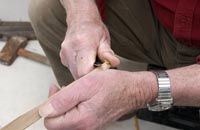From his perch in Poole's Fish Market, which he ran for half a century, Captain Everett H. Poole watched Menemsha harbor fade from being one of the busiest fishing ports on the East Coast.
He remembers when 200 swordfish were landed in a single day. But a national overinvestment in the industry during the late 1970s led to a quick depletion of the fisheries, and today Menemsha is lucky to see five swordfish in a year.
Now Captain Poole is watching the same thing happen on the Island, where an intrusion of money and overdevelopment is eating away at its natural resources and upending what was once a sound and self-sufficient economy.
Within his lifetime, he has seen the Vineyard transform from a community of farmers and fishermen to an Island dependent on tourism and second homes. People visited for the summer when he was younger, which provided some extra income for town residents. But they did not rely on it for their livelihood, he said. It was not the lifeblood of the economy.
"Everyone in those days was either fishing or farming or both. That's how we used to make our living here, and we enjoyed it," said Mr. Poole, 76, the longtime Chilmark town moderator with an iconic chinstrap beard.
"As Jimmy Morgan said, ‘We were poor, but we didn't know it.'"
When Mr. Poole was a kid, local farmers delivered fresh milk and strawberries door-to-door. His father, a fisherman, would salt down cod in the fall and trade it to his neighbors for vegetables in the winter. Sometimes he provided them with a little extra, in case they slaughtered an animal and had surplus meat.
So for Mr. Poole, who can trace his Vineyard roots to the earliest European settlers, it is difficult to see the Island track its economy based on ferry passengers and real estate sales, instead of the well-being of the community.
"In those days, people lived here because they liked it. Not because they thought they could make a quick buck, which is why most people are here now," he said.
"It's put the price of land so high that the next generation can't afford to inherit the family property. That's the mess I'm in," added Mr. Poole, whose 12 acres on Nasaquitsa Pond were valued by the town this year at more than $10 million. "I'm living on land that has been in the family over 300 years, and the government's going to get it."
He is sitting on his lobster boat named after his wife Virginia, a retired English teacher and writer, with whom he has three adult children and shares a 50th anniversary today. Mr. Poole is taking a short break from replacing the fuel tank, while nearby shop owners prepare their storefronts for Memorial Day weekend. A couple drives by in a convertible with New York state license plates.
"A lot of people sold out and made a lot of money. But those of us who wanted to stay here for a home are left with the results," Mr. Poole said, looking up from a shingle he is whittling and peering out over his shoulder. "I hate to think what this place is going to look like in another 50 years."
Helping shape that future will be a primary goal of the Martha's Vineyard Commission in its comprehensive Island Plan, an ambitious three-year effort that will attempt to chart a course for the coming decades.
It is a process familiar to Mr. Poole, who in the 1960s served on a Dukes County planning agency that commissioned the first study to project what the future held for the Island. Facing a coming development boom, the Metcalf and Eddy report painted a rather bleak picture of increasing population growth, traffic congestion, degradation of the environment, and a shortage of affordable year-round housing.
"It shook up a lot of people," Mr. Poole said. "But we got just what it said was going to happen."
The report, released in 1971, spurred the Massachusetts state legislature to create the Martha's Vineyard Commission, a new land use planning and regulatory agency vested with broad powers to protect all that was unique and significant about the Island. Vineyard voters elected Mr. Poole to the very first commission in 1974, when he helped frame the early regulations and goals of the regional agency.
Offering a frank assessment, Mr. Poole said the commission has not lived up to its original charge. He believes recent commission members have been caught up in building regulations and protecting the vacation industry, at the expense of promoting a more sustainable economy based on farming and fishing.
The first document adopted by the commission, and co-authored by Mr. Poole, said the agency would "give top priority to promoting development of activities which will increase the Island's self-sufficiency, particularly in regard to production of food products; and which will diversify the economic base, so that the Island will be less reliant on the building and tourist trades."
He does not believe that has happened.
Mr. Poole remembers when the Island was more self-sufficient, and he said both the environment and businesses were better off. But things changed as the population grew, transportation became more accessible, and the consumption of goods increased.
"When I was a kid, the Chilmark Store was open year-round, six days a week. And the guy made a decent living there. Then, after the second World War, when everybody had automobiles and a lot more money, they all started going to Vineyard Haven to do their shopping. The Chilmark Store folded up, and since then it's only been open in the summer," he said.
"Now, we have excursion rates on the ferry for Islanders, who are all going to Falmouth to do their shopping," Mr. Poole said, describing a steady business migration to the north. "Pretty soon we aren't going to have anything left over here."
Self-reliance is etched in his history and visible in his calloused hands. When a state redistricting plan threatened to take away the Vineyard's seat in the Massachusetts house of representatives 30 years ago, Mr. Poole, the then-chairman of the Chilmark board of selectmen, made the original motion that called for the Island to secede from the commonwealth.
"All I got out of that was a half-gallon of maple syrup from the governor of Vermont, who said his state wanted some shoreline," Mr. Poole recalled this week. "I sent him four pints of chowder and said I was willing to talk. But that was the end of that."
So what would Captain Poole do if he was elected governor of Martha's Vineyard?
"Make it harder to get here," he replied without a moment's pause. "I'd cut ferry boat trips in half, and shorten up the runways at the airport. We're way too convenient to New York and Washington."
This accessibility - coupled with publicity over the last 15 years - has attracted a different type of visitor and seasonal resident to the Vineyard.
"Most of the people I knew as a kid who came here for the summer, their families don't come anymore because it's not the same place it was," Mr. Poole said. "I had one person tell me last year they had to take a whole month off after coming to the Vineyard for vacation because of all the social obligations - they had to go from cocktail party to cocktail party. We don't need that."
If he was in charge, he would take steps to deter more visitors.
"I don't know what else we could do," Mr. Poole said with a wry smile. "Maybe get the Chamber of Commerce to promote the fact that we have a surplus of fog, deer ticks and poison ivy."
He acknowledges that his remarks might be inflammatory to some, and that the tourist economy is currently keeping many businesses afloat. But he feels strongly that a downturn in the vacation industry and real estate market would prove a long-term benefit to the Island.
"Right now everyone's hellbent on making huge mortgage payments, and the only way they think they can do it is to build another trophy house and sell it for a big profit," Mr. Poole said. "But if the Vineyard stopped building new houses tomorrow, all the contractors would still have enough work fixing up all these old houses because they're so shoddily built."
Today Mr. Poole runs an old chandlery shop in Menemsha, offering various fishing supplies, much of it left over from his younger days. Things are generally quiet in the shop, though he sells a fair amount of bulk rope and the occasional bucket of paint.
But he enjoys the work and is not in it for the money.
"I don't sell much," Captain Poole said, lighting up a pipe of tobacco. "But I don't expect to."









Comments
Comment policy »